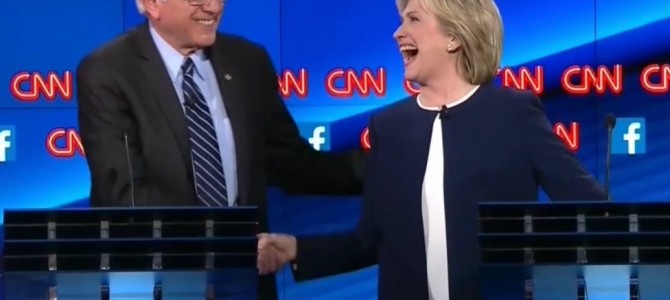
Bernie Sanders is getting jobbed in the Democratic primary. His voters are getting jobbed in the Democratic primary, too. That’s the way the system is designed, although it took a few decades to really get up and running.
It all started way back in 1968, when Eugene McCarthy’s nomination was thwarted at the Democratic convention and Hubert Humphrey was nominated instead. To make the nominating process more responsive to the grassroots, the party created superdelegates. These delegates are not bound by primary results, or really anything. They’re just the 20 percent who hang around and, as yet, have not swung a primary away from the candidate who received the popular vote.
This year, though, is unlike any year in recent memory, at least insofar as the primaries are concerned. Perhaps you’ve noticed. The current Real Clear Politics polling average has Hillary Clinton above Sanders 53.5 percent to 41 percent. On the ground, the percentages are roughly the same. Of 34 primaries and caucuses leading up to New York’s results Tuesday, Clinton won 18 while Sanders took 16, or 53 percent. After Tuesday, that became 54 percent for Clinton. So far, so good. When the delegate count is factored in, however, that’s where it gets ugly.
Delegation Doesn’t Require Representation?
Clinton has so far torched Sanders with delegate totals, leading him 1,911 to 1,229. When put into percentage form, that is 60 percent of the delegates available. But percentages are a good way to obscure the truth, to make things look better or worse than they are. What about those superdelegates? Are they doing a super job?
Well, of the 500 superdelegates that have committed, 469 have committed to Clinton, while only 31 are feeling the Bern. To go back to percentages, just for fun, that’s 93.8 percent of superdelegates. For a system that was put in place to make sure the grassroots had a voice, that is not what might be considered a super job. In fact, it’s a pretty terrible job, unless you’re angling for a guaranteed job in a Clinton administration.
It bears mentioning that superdelegates can change their minds. In 2008, once the Barack Obama juggernaut became undeniable, that is precisely what happened. It could happen again in 2016. Sanders won the seven contests prior to the New York primaries and is experiencing what most would call momentum.
In this case, it bears mentioning that “most” does not include many pundits, and other important voices are very good at explaining why all of Sanders’ wins don’t really mean anything. Seriously, go peruse a Google search of “Sanders momentum” and you’ll find hot takes and explainers aplenty, all of which show us why Sanders victories aren’t victories in the traditional sense of the term and why they don’t matter even if they are. He was kind of negative at the last debate in New York, after all.
Stop Referring to a String of Victories as Momentum
Most of this has been obscured by the circus on the Republican side of the aisle. Donald Trump, who is increasingly adept at displaying a 2008 Hillary Clinton-esque knack for not understanding how delegates are selected, has been coasting on momentum for quite some time. Momentum isn’t everything, thankfully, and now math is not on the Donald’s side, although Republicans have to be at least a tad jealous of those Democratic superdelegates about now.
But as to that product of mass and velocity Sanders is experiencing, Democratic Party leaders have worked diligently to keep the man with the permanently windblown hair from giving off the air of actually experiencing it and from getting all that sweet, sweet free press Trump is so adept at securing from his momentum.
Were Democratic leaders to acknowledge it, some superdelegates might actually start switching their allegiance, and it seems making sure the grassroots are heard is only for years when the grassroots and the party leaders are on the same page. Otherwise, there’s a reason they’re kept outside the convention hall or escorted away when they get too raucous.
You’ve Heard the Electorate Is Angry
So while the fight on the Right has centered around “the establishment,” a nebulous and nefarious organization so powerful that Jeb Bush had to drop out before Florida, it’s on the Left where the establishment is actually screwing over voters. It’s right there in the numbers.
Whether this is shrewd or folly remains to be seen. Hillary would be competitive in the general, and winning elections has a way of smoothing out the internecine fights that lead up to those elections, but so far in the battle for 2016, it’s 1968 all over again, only with memes and scathing Facebook posts rather than riots.
On both sides, the electorate is angry this year, like an old man trying to send back soup in a deli. On the Democratic side, when the plates and old man are cleared, party leaders will be forced to confront the fact that they ignored that energy and didn’t offer a suitable substitution. They responded with “No soup for you!” Sure, it’s one way to run your establishment, but not the way you want to run it if repeat business is your goal.









